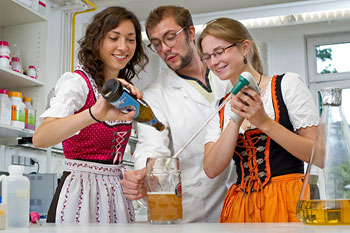TUMstudis:
Baker's yeast is synthetically converted

Baker's yeast, saccharomyces cerevisiae in Latin, is a production organism commonly employed in biotechnology. The team of TUM students will endeavor to modify it genetically so that it produces nutritionally valuable substances (especially ones that are normally extracted from plants) bio-synthetically, so they do not need to be extracted from other expensive ingredients to be added to food or beverages.
New approaches to the art of brewing
The team consists of 19 TUM students. Most of them are studying molecular biotechnology, but there are also computer scientists, mathematicians and brewers involved. Prof. Dr. Arne Skerra (Biological Chemistry) is providing support in scientific matters. The team is trying to combine traditional Weihenstephan brewing techniques with molecular biotechnology and innovative, up-and-coming research.
During the course of the iGEM project, promoters that can easily be regulated in different ways (ethanol content, light exposure etc.) will be combined with known bio-synthetic components and then cloned in yeast. The aim is to show how modern biotechnological methods are able to break new ground in the production of foods and beverages.
TUM team gold medal
iGEM stands for "International Genetically Engineered Machine competition." The international competition in the field of synthetic biology was introduced at the MIT (Massachusetts Institute of Technology, USA), Boston, in 2003. It now has an international reputation.
Both familiar and newly devised genetic blocks ("BioBricks") are used to build up modular biological systems – usually in micro-organisms. More than 160 teams of student from all around the world took part last year. The TUM team won a gold medal for its project in the field of biophysics. It was one of the most successful German teams.